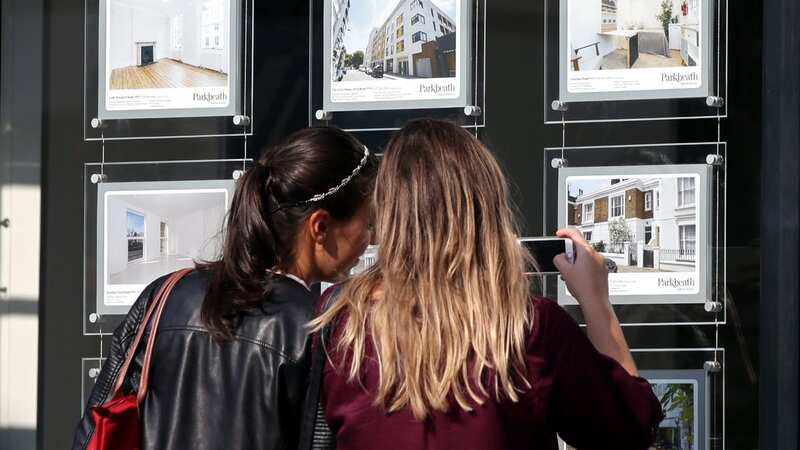UK house prices rise for first time in six months, says Halifax

The average UK house price jumped by around £3,000 month-on-month in October - marking the first monthly increase since March, according to Halifax.
The building society said house prices rose by 1.1% on average in October, compared to a fall of 0.3% in September. A low supply of homes for sale is likely to have strengthened prices in the short term, Halifax said. Property values in October were typically lower than a year earlier and Halifax does not expect to see an overall growth in house prices until 2025.
The typical UK home was valued at £281,974 in October, up by about £3,000 on the previous month. In September, the average UK house price was £278,985. However, the average house price was 3.2% lower in October than a year earlier. Kim Kinnaird, director, Halifax Mortgages, said: "UK house prices rose in October, up 1.1% on a monthly basis, breaking a run of six consecutive monthly falls."
She added: "Prospective sellers appear to be taking a cautious attitude, leading to a low supply of homes for sale. This is likely to have strengthened prices in the short-term, rather than prices being driven by buyer demand, which remains weak overall. While many people will have seen their income grow through wage rises, higher interest rates and wider affordability pressures continue to be challenges for buyers.
"Across the medium term, with financial markets not anticipating a decline in the Bank of England's base rate soon, we expect house prices to fall further overall with a return to growth from 2025. The current picture should continue to be seen in the context of the longer-term house price trend as, on average, prices remain around £40,000 above pre-pandemic levels."
 UK house prices fall again - down 3.2% from last year peak, says Nationwide
UK house prices fall again - down 3.2% from last year peak, says Nationwide
Halifax said that, against a backdrop of rising rents, the first-time buyer market has held up relatively well. The report said the latest house price data shows prices for first-time buyers are down by 2.4% annually, a notably smaller fall than the market generally (a 3.2% fall), over the past year.
Halifax's findings are similar to those of Nationwide Building Society, which reported last week that house prices rose by 0.9% on average month-on-month in October. The society said last week that this likely reflected a constrained supply of properties for buyers to choose from.
The Halifax report showed that annual price falls in October ranged from 6.0% in the South East of England, where house prices are often higher than in many other parts of the UK, to just 0.2% in Scotland.
Stephen Perkins, managing director at Norwich-based broker Yellow Brick Mortgages, said: "After last week's Nationwide house price curveball, we've got another. The lack of supply is certainly pivotal to these upticks in house prices but demand is also picking up as more and more buyers sense a bargain. First-time buyers, in particular, are in a strong position and know that they hold a lot of bargaining power at present."
Ross McMillan, director at Glasgow-based, Blue Fish Mortgage Solutions, said: "In Scotland, first-time buyers are definitely on the rise but many are now planning their house-buying for early 2024 rather than rushing for a pre-Christmas purchase. Many believe that the Bank of England's rate hold last week suggests rates may have peaked and it's this hope, rather than any national price data or forlorn expectations of house price crashes, that is currently boosting confidence in the Scottish property market."
Tom Bill, head of UK residential research at estate agent Knight Frank, warned: "Thin trading means monthly price movements should be handled with care but price falls have been kept in check by the hesitancy of both buyers and sellers." He added: "It means this slowdown has been a story of weak sales volumes, not fast-declining prices. House prices will continue to come under pressure but we think they will bottom out in 2024. We expect a decline of 7% this year and 4% next year as inflation comes under control and mortgage rates stabilise."
Jeremy Leaf, a north London estate agent, cautioned: "We are not getting carried away with the modest rise in prices shown here. Transactions remain subdued so looking forward we don't expect to see much improvement in the market until January or February of next year as the earliest."
Iain McKenzie, CEO of the Guild of Property Professionals, reassured: "Sellers should be reassured by the stability in house prices we are currently seeing. While you may not receive the same offer you would have this time last year, properties are still worth considerably more than pre-pandemic levels."
Average house prices in October followed by the annual price change
- East Midlands, £231,455, minus 5.3%
- Eastern England, £322,451, minus 5.3%
- London, £524,057, minus 4.6%
- North East, £166,216, minus 3.3%
- North West, £221,897, minus 3.0%
- Northern Ireland, £183,922, minus 0.5%
- Scotland, £202,608, minus 0.2%
- South East, £374,066, minus 6.0%
- South West, £292,187, minus 5.7%
- Wales, £213,125, minus 3.9%
- West Midlands, £245,006. minus 3.4%
- Yorkshire and the Humber, £200,321, minus 3.6%
* An AI tool was used to add an extra layer to the editing process for this story. You can report any errors to webhomepage@mirror.co.uk
Read more similar news:
Comments:
comments powered by Disqus

































